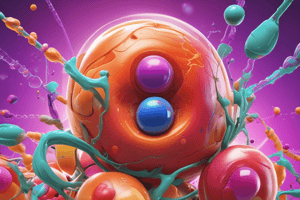Podcast
Questions and Answers
What happens when an individual's blood glucose concentration rises very high?
What happens when an individual's blood glucose concentration rises very high?
- The kidneys increase glucose reabsorption from the filtrate in the nephron.
- The pancreas releases more insulin to lower blood glucose levels.
- The kidneys are unable to reabsorb it all from the filtrate in the nephron, and some remains in the urine. (correct)
- Glucose is stored in the liver for later use.
Why do individuals with type 1 diabetes need to adjust their meals based on their activity level?
Why do individuals with type 1 diabetes need to adjust their meals based on their activity level?
- To increase glucose storage in the liver.
- To reduce insulin resistance.
- To maintain a constant body temperature.
- To balance carbohydrate consumption with glucose breakdown during respiration. (correct)
What is the purpose of rapid-acting insulin in individuals with type 1 diabetes?
What is the purpose of rapid-acting insulin in individuals with type 1 diabetes?
- To be taken before or after meals to regulate blood glucose levels. (correct)
- To provide a background dose of insulin once a day.
- To regulate body temperature.
- To stimulate glucose storage in the liver.
What is a normal characteristic of urine in individuals without type 1 diabetes?
What is a normal characteristic of urine in individuals without type 1 diabetes?
What is the primary function of the skin in relation to homeostasis?
What is the primary function of the skin in relation to homeostasis?
What is the consequence of uncontrolled blood glucose levels in individuals with type 1 diabetes?
What is the consequence of uncontrolled blood glucose levels in individuals with type 1 diabetes?
What type of insulin provides a background dose once a day in individuals with type 1 diabetes?
What type of insulin provides a background dose once a day in individuals with type 1 diabetes?
Why is it important for individuals with type 1 diabetes to eat smaller, frequent meals?
Why is it important for individuals with type 1 diabetes to eat smaller, frequent meals?
What happens when the kidneys are unable to reabsorb glucose from the filtrate in the nephron?
What happens when the kidneys are unable to reabsorb glucose from the filtrate in the nephron?
What is the primary goal of managing blood glucose levels in individuals with type 1 diabetes?
What is the primary goal of managing blood glucose levels in individuals with type 1 diabetes?
Flashcards are hidden until you start studying




